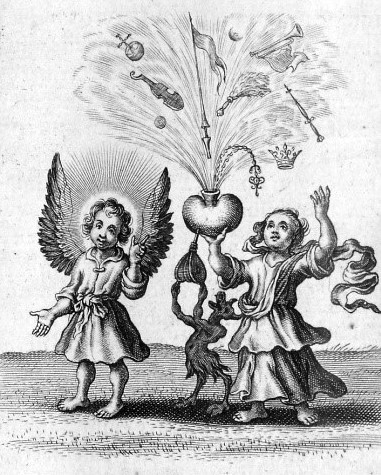1699 · Salzburg
by THEOPHILUS à Sancto Alberto
Salzburg: Melchior Haan, 1699. 4to (198 x 155 mm). [14], 264, [3], [1] blank pp. Engraved frontispiece of Susanna (fully clothed) and the elders, woodcut printer’s device at end; title in red & black, type-ornament headpieces, woodcut initials and tailpieces. (Fore-edge of frontispiece extended apparently at the time of binding, small wormhole in gutter of first few leaves, light browning to text block, occasional foxing.) 18th-century pink paper-covered boards backed in parchment manuscript waste from a ?15th-century (?folio) manuscript missal, in a textura hand in red and black ink, in two columns, lightly ruled in lead, showing 5 lines in each column (contents below); left column with first line and large initial I in red ink; pair of green silk fore-edge ties (a few small wormtracks to boards, front cover faded). Provenance: Kötschach (Carinthia, Austria), Servites, two ownership inscriptions: on title: Residentia Cathesiensis Ord. Serv. B. M. V. 1713, and on front pastedown, another, possibly later inscription apparently from a nun of the same order: Ex libris Am. R. ac pie ... D[omini] Oswaldi Parochi quondam Cathesio. Sankt Oswald is a town located in the district of Melk within the Austrian state of Lower Austria.***
Only Edition of a collection of sermons containing entertaining stories for Lent, intended for women. The Susanna story from the Book of Daniel serves as a departure point for the sermons, which provide a plainly written Biblical exegesis for simple folks, “in part almost novelistic, informally colloquial, with aphorisms, instances & anecdotes” (Jantz).
The author, a Carmelite priest from Straubing in Bavaria, dedicated his sermon collection to the superior and noble ladies of the wealthy Damenstift in Hall, Tirol. Not officially a convent, because run by the Jesuits, this Collegium Virginum provided a comfortable home for single women from wealthy, usually noble families of the Habsburg dominions. The superior at the time was Countess Maria Elisabeth von Kuefstein zum Spitz auf Greillenstein; her predecessors and successors included members of the richest families in the Empire. While they were expected to perform works of charity, to practice six hours of daily prayer, and to maintain the rather splendid establishment without servants, the women led pleasant lives, free of financial care. The author evidently hoped that his sermons / stories, delivered from the pulpit of his church to large crowds (according to his title), would also divert and edify these rich women from influential families. No other works by him are recorded.
The manuscript waste covering the spine of this volume contains, in the left column, a passage from Mass for the first Sunday after Epiphany (noted in the first line, in red ink): In excelso throno vidi sedere viru[m] que[m] adoret [sic] multitudo angeloru[m] psallentes i[n] unu[m] ecce cuius imperii nomen est in [aeternum]. The right-hand column contains a passage from Romans 12,3-5: mensura[m] fidei [sic]ut e[n]im in uno corp[or]e multa me[m]bra h[ab]emus: om[n]ia aut[em] membra no[n] eundem actu[m] h[abe]nt ita multi unu[m] corpus [sumus] in....
This copy was owned by nuns from the Servite convent of Kötschach in Carinthia, Austria.
In America OCLC lists only the Jantz copy at Duke. Hayn and Gotendorf could not locate a copy and suspected a ghost.
VD 17 23:638787H; Jantz (German Baroque literature: a descriptive catalogue of the collection of Harold Jantz, 1974) 2485. Hayn-Gotendorf, Bibliotheca Germanorum Erotica & Curiosa. Verzeichnis der gesamten deutschen erotischen Literatur (1912-1929) VII, 626 ("Wirklich erschienen?"). (Inventory #: 4367)
Only Edition of a collection of sermons containing entertaining stories for Lent, intended for women. The Susanna story from the Book of Daniel serves as a departure point for the sermons, which provide a plainly written Biblical exegesis for simple folks, “in part almost novelistic, informally colloquial, with aphorisms, instances & anecdotes” (Jantz).
The author, a Carmelite priest from Straubing in Bavaria, dedicated his sermon collection to the superior and noble ladies of the wealthy Damenstift in Hall, Tirol. Not officially a convent, because run by the Jesuits, this Collegium Virginum provided a comfortable home for single women from wealthy, usually noble families of the Habsburg dominions. The superior at the time was Countess Maria Elisabeth von Kuefstein zum Spitz auf Greillenstein; her predecessors and successors included members of the richest families in the Empire. While they were expected to perform works of charity, to practice six hours of daily prayer, and to maintain the rather splendid establishment without servants, the women led pleasant lives, free of financial care. The author evidently hoped that his sermons / stories, delivered from the pulpit of his church to large crowds (according to his title), would also divert and edify these rich women from influential families. No other works by him are recorded.
The manuscript waste covering the spine of this volume contains, in the left column, a passage from Mass for the first Sunday after Epiphany (noted in the first line, in red ink): In excelso throno vidi sedere viru[m] que[m] adoret [sic] multitudo angeloru[m] psallentes i[n] unu[m] ecce cuius imperii nomen est in [aeternum]. The right-hand column contains a passage from Romans 12,3-5: mensura[m] fidei [sic]ut e[n]im in uno corp[or]e multa me[m]bra h[ab]emus: om[n]ia aut[em] membra no[n] eundem actu[m] h[abe]nt ita multi unu[m] corpus [sumus] in....
This copy was owned by nuns from the Servite convent of Kötschach in Carinthia, Austria.
In America OCLC lists only the Jantz copy at Duke. Hayn and Gotendorf could not locate a copy and suspected a ghost.
VD 17 23:638787H; Jantz (German Baroque literature: a descriptive catalogue of the collection of Harold Jantz, 1974) 2485. Hayn-Gotendorf, Bibliotheca Germanorum Erotica & Curiosa. Verzeichnis der gesamten deutschen erotischen Literatur (1912-1929) VII, 626 ("Wirklich erschienen?"). (Inventory #: 4367)








![[Timaeus]. De universitate sive de origine mundi libellus](https://d3525k1ryd2155.cloudfront.net/h/135/542/1665542135.0.m.jpg)
